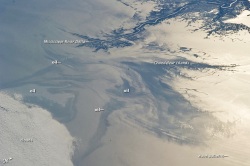 BP Oil Spill Victims Still Need Health Care
BP Oil Spill Victims Still Need Health Care
Victims of BP oil spill still need health care: A guest column by Kerry Kennedy
More than a year after a private company operating in public waters retched 170 million gallons of crude and 2 million gallons of toxic dispersants into the Gulf of Mexico, creating one of the world’s largest environmental catastrophes, we still lack thorough and reliable statistics on the BP oil disaster’s impact on the health of residents.
Along with Stephen Bradberry, who is the executive director of the New Orleans-based Alliance Institute and the recipient of the 2005 RFK Human Rights Award, I recently joined a delegation traveling across the Gulf Coast region, speaking with fishermen, oystermen, shrimpers, restaurant workers and neighbors about the illnesses they have suffered in the wake of this calamity.
I couldn’t help but think of the trip that my father, Robert Kennedy, made to the Mississippi Delta in 1967. He was horrified by the poverty, the children whose bellies were “swollen with hunger.” He believed we had a duty, as a nation, to relieve their suffering and soothe their pain.
Today, the children and grandchildren of those very same families continue to suffer from systemic governmental neglect, the debilitating heritage of communities marginalized by skin color, religion, education level, income or access to power. It is long past time for federal action.
In Biloxi, Miss., a fisherman named Kwan told us he was on a cleanup crew for BP, and he and his fellow fishermen have had rashes across their bodies, which itch until they bleed, ever since. In that city, the health care facility is so over-booked, it takes up to three months for a doctor’s appointment.
Catfish Miller, another fisherman, also worked on the cleanup crew for BP. He was denied gloves, a respirator, eyewear or any form of protective gear. He suffered searing headaches, ear infections and sores in his nose and throat for months on end. He said no doctor he went to would tie his ailments to toxic poisoning.
We heard dozens of people across the region talk about similar health problems and obstacles to care, including long travel distances to health facilities and the need for cash outlay among those in cash-strapped communities. There are many other reasons.
Local doctors generally lack access to the expertise, training and equipment to diagnose toxic poisoning. They don’t want to be called as expert witnesses in lawsuits with BP. They are afraid of malpractice suits and will not treat patients unless they have specialty training, adding to the disincentives to diagnose. And, with most patients self-employed and uninsured, few can afford the expensive tests and medicines necessary to show causation and obtain proper care.
Last year, President Obama pledged that Gulf residents would be “made whole.” To honor that pledge, Congress must ensure that health care is adequate, affordable, proximate and available; that health care workers are trained to diagnose, track and treat toxic poisoning; and that the people of the Gulf are treated with respect, no matter what their background.
There is a solution. The late Sen. Edward M. Kennedy signed the first federal law providing community health care centers to people in need. Today, 23 million Americans depend on those centers for care. Under legislation passed last year, the centers would expand to include 40 million Americans, many of them along the Gulf Coast.
If Republicans in Congress don’t make good on their threat to decimate the progress that’s already been made, the people of the Gulf might stand a chance.
First responders to the 9/11 tragedy did not have to prove causation in order to get treatment, they only had to show they were in the vicinity of the terrorist attack. Similarly, the 150,000-strong cleanup crew who sacrificed themselves, and their families and neighbors who live along the Gulf Coast, should not have to prove that their symptoms are caused by BP’s catastrophe, only that they were there.
It’s time for us to provide the families of the Gulf Coast with the health care they deserve.
••••••••
Kerry Kennedy is president of the Robert F. Kennedy Center for Justice & Human Rights
source: Victims of BP oil spill still need health care: A guest column by Kerry Kennedy | NOLA.com








